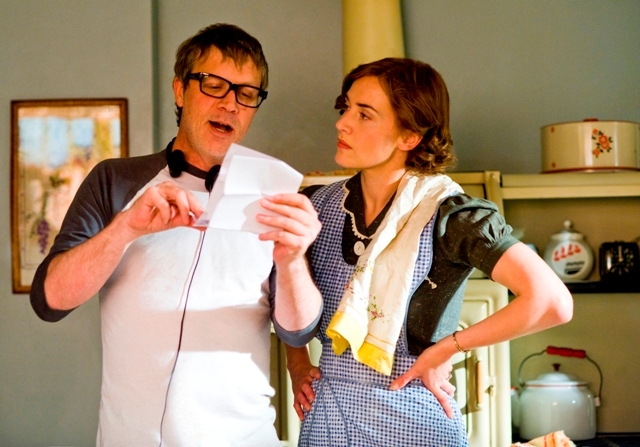Sunday, April 3, 2011
PHOTOS |
COMING SOON|
EXAMINER.COM FILM ARTICLES
||HOME
INTERVIEW
Todd Haynes Showcases
Another Revolutionary Lady

Todd Haynes, director of "Mildred Pierce".
The five hour, 38 minute drama airs on HBO.
Omar P.L. Moore/PopcornReel.com
by
Omar P.L. Moore/PopcornReel.com
 FOLLOW
FOLLOW
Sunday,
April 3, 2011
SAN FRANCISCO
THERE ARE TWO PLATES of food consisting mostly of salad. The food is
scattered, probably because Todd Haynes has been picking at it throughout a very
busy day. The director politely offers his guest a chance to sample what's left.
Removing his glasses and imbibing some water, Mr. Haynes turns away from a pecking
ritual and is ready to talk about
"Mildred Pierce", his well-received long-form
television drama based on James M. Cain's 1941 novel, that debuted on HBO last
Sunday.
The director is prompted to respond to what appears a fetish for a particular
kind of scene in his films. Mr. Haynes showcased spanking in "Dottie Gets
Spanked", a television film that aired in the early 1990s on PBS, and it became a mild
obsession in other work.
"For a while there I couldn't make a movie without a big spanking scene in it.
And I think I gave it up around 'Velvet Goldmine' (1998)."
"But it has fully returned," Mr. Haynes said, tongue in cheek.
Anyone watching Part 2 of "Mildred Pierce" during the week will have seen its
re-entry during a moment when Mildred puts her daughter Veda over her knee and
gives her a good hiding.
Part 3 of "Mildred Piece" airs tonight, and it stars Kate Winslet in the
title role.
"In a weird way, she's almost -- it's almost like she's an outsider to herself.
The intensity of her pre-occupation with Veda, and what she isn't getting -- the
emotional frustration of this investment in this child -- and what she's not
getting in return turns (Mildred) into this machine of work and productivity,
and task-mastering, you know - 'I'm gonna figure this out, I'm gonna make this
work.'"
Mr. Haynes has directed films where the outsider or "other" is constrained by
the irrationalities, mores or the toxicity of the larger society surrounding
them. In "Poison" three stories surrounded characters shunned by the
mainstream. In "Safe" the atmosphere of suburbia was the sickness
inhabiting Julianne Moore's soul. In "Far From Heaven" Ms. Moore's
relationship with a black man (Dennis Haysbert) while her husband's closeted gay
behavior is treated as an illness, was wrapped in 1950s Douglas Sirk-like
melodrama.
Cinematographer Ed Lachman has worked with Todd Haynes before on such films as
"Far From Heaven", and his many shots through glass in "Mildred
Pierce" was explained by Mr. Haynes. "It started, I think, feeling that I
had to introduce a sense of watching. Of watching -- kind of as a thematic
in the family dynamic. In families no one's ever free from being watched
by somebody else in the family. We know from the story that Veda is always
aware of what's hidden under the closet.
"We were inspired by the films of Rainer Fassbinder, who does like to frame
domestic settings through doorways. Then I was introduced to this
photographer Saul Leiter, and his mid-century, or his most famous work, sort of
mid-century New York-based photographs, "Early Color". But he loved the
innate abstraction that would happen through old glass, antique glass,
precipitation through windows, dust on car windows...just exquisitely specific,
beautiful sensibility that was really helpful to us."

Director Todd Haynes and Kate Winslet on the set of "Mildred Pierce".
HBO
Additionally, Mr. Haynes used the styles of Fassbinder, Leiter and some 1970s
films as an expedient measure for his five hour, 38-minute film for HBO, which
was shot in 60mm.
"It also was a way of dealing with our limited budget, because you gain a sense
of real space of time, a sense of real specificity in where you are. So it
was a practical interest as well because it limits the frame and muddies it, and
makes it more beautiful, but it also makes you feel intensely present."
Todd Haynes's "Mildred Pierce" is completely different from the 1945 noir film
directed by Michael Curtiz, which starred Joan Crawford in an Oscar-winning
performance as the title character. The director said he admired Mr.
Curtiz and his film a great deal, but made a decision early on to focus more on
Mr. Cain's novel, which centralized the tense mother-daughter relationship
between Mildred and Veda. Veda is played by two actresses: Morgan Turner
as childhood Veda, and Evan Rachel Wood as teenage Veda.
There is a great deal of love Mildred and Veda have for each other despite the
separation anxieties and tensions typically seen in adolescent
daughter-relationships that inherently provoke anger and recrimination in
"Mildred Pierce", which plays and repeats throughout this month on HBO.
"And I think it was really important to show Veda's vulnerabilities and moments
of self-doubt," Mr. Haynes commented. He cites moments in the film
pointing to Veda and her talents as a pianist.
"Freedom and openness are illusory," Mr. Haynes notes of Mildred, who is trapped
by the need to keep Veda in the fold and gain her approval.
"Mildred Pierce" is set in the American Depression Era of the 1930s, with Hoover
as the nation's president. With women winning the right to vote in America
in 1920, Mildred has strong political ideas, doing things on her own terms and
without apology -- something seen as rare for a woman of that time in the United
States. Set in Glendale, California, Mr. Haynes's drama was filmed on
location on the East coast, and during a recent Q&A here the director
mentioned that Peekskill in upstate New York served as a location for many of
the Glendale outdoor scenes. Interiors were shot in Los Angeles. The film
shoot lasted 71 days during mid-2010.
Mr. Haynes talks about Kate Winslet as his choice to play Mildred Pierce.
He had never really considered any other actress for the role while reading Mr.
Cain's novel in the fall of 2008, which coincidentally was around the time Ms.
Winslet was on the big screen in "Revolutionary Road" as a woman with boundless
idealism trapped in the rigidity of the 1950s America. Mr. Haynes said he
hadn't been prompted to cast the actress based on Ms. Winslet's work in Sam
Mendes's drama.
"She has a kind of physicality, a work ethic, that she exhibits in a lot of her
roles that I just saw in Mildred, combined with that sensual side of Mildred in
the relationship with Monty (played by Guy Pearce)...and also the fact that
[Mildred] was a young mother. And she was described in the novel as age
28, when we start the story, and age 37 at the end -- all these reasons made me
think of Kate. And I couldn't really shake it."
Ms. Winslet is the proud mother of two children -- one girl and one boy.
*
*
*
When it is put to Mr. Haynes that he should have been considered an Oscar
nominee for directing the Focus Features release "Far From Heaven" as well
tapped for a best picture nod -- the film was
nominated for best actress, original screenplay, cinematography and music -- Mr.
Haynes laughed it all off.
"That was the one movie I didn't have Harvey Weinstein helping me on.
That might have had something to do with it -- who knows?", Mr. Haynes joked.
"Helping," he added, smiling.
Part three of "Mildred Pierce" airs tonight on HBO and is repeated, as are
all episodes, throughout April on the pay-television cable network.
Audio-visual: Todd Haynes on Elizabeth Taylor, March 2011
 FOLLOW
FOLLOW
SUBSCRIBE TO THE POPCORN REEL MOVIE
REVIEWS RSS FEED
